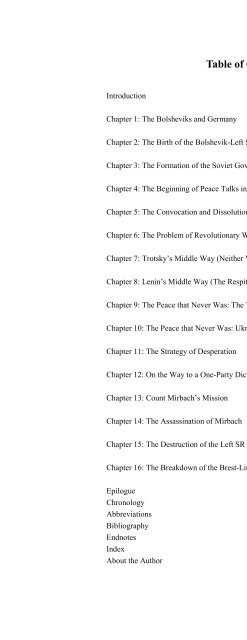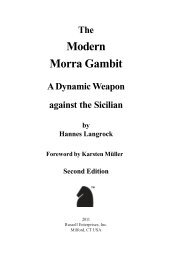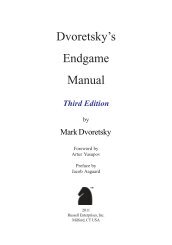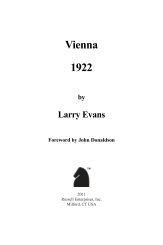Lenin, Trotsky, Germany and the Treaty of Brest-Litovsk The ...
Lenin, Trotsky, Germany and the Treaty of Brest-Litovsk The ...
Lenin, Trotsky, Germany and the Treaty of Brest-Litovsk The ...
Create successful ePaper yourself
Turn your PDF publications into a flip-book with our unique Google optimized e-Paper software.
<strong>Lenin</strong>, <strong>Trotsky</strong>, <strong>Germany</strong> <strong>and</strong> <strong>the</strong> <strong>Treaty</strong> <strong>of</strong> <strong>Brest</strong>-<strong>Litovsk</strong>not necessarily have to begin <strong>the</strong>re, but its victory in <strong>Germany</strong> seemed to allrevolutionaries to be a prerequisite <strong>of</strong> success. <strong>The</strong> Social Democratic rhetoric <strong>of</strong><strong>the</strong> time did not allow for any o<strong>the</strong>r conception <strong>of</strong> <strong>the</strong> world revolution. And <strong>the</strong>Russian revolutionary <strong>Lenin</strong>, prior to March 1917, saw no greater role for himselfthan that <strong>of</strong> <strong>the</strong> leader <strong>of</strong> <strong>the</strong> extremist wing <strong>of</strong> Russia’s Social Democraticmovement, which was unquestionably secondary <strong>and</strong> subsidiary to <strong>the</strong> Communistmovement in <strong>Germany</strong>.In <strong>the</strong> days leading up to <strong>the</strong> war, it was to <strong>Germany</strong>’s Social Democratic movementthat <strong>the</strong> eyes <strong>of</strong> all <strong>the</strong> socialists in <strong>the</strong> world were turned. It seemed that byvoting against giving <strong>the</strong> government war credits in <strong>the</strong> Reichstag, <strong>the</strong> GermanSocial Democratic Party could stop <strong>the</strong> impending tragedy. <strong>The</strong> German socialists,however, voted in favor <strong>of</strong> <strong>the</strong> war credits, in part because <strong>the</strong>y hoped that<strong>the</strong> war would topple <strong>the</strong> monarchy in Russia, which <strong>the</strong>y regarded as <strong>the</strong> principalenemy <strong>of</strong> <strong>the</strong> international socialist movement. 2By voting for <strong>the</strong> war credits, <strong>Germany</strong>’s socialists gave a free h<strong>and</strong> to <strong>the</strong> socialists<strong>of</strong> o<strong>the</strong>r countries. A Social Democratic newspaper owned by Menshevikdefencists commented on <strong>the</strong>se events as follows:<strong>The</strong> International has turned out to be weak. <strong>Germany</strong>’s Social Democracy, <strong>the</strong>International’s most powerful component, not only did not oppose its governmentwhen <strong>the</strong> government declared war on Russia <strong>and</strong> France <strong>and</strong> threw its army atsmall, neutral Belgium, but used all its strength to support its Kaiser... It is ridiculous<strong>and</strong> naive, <strong>the</strong>refore, to count on a German revolution. <strong>The</strong> socialists <strong>of</strong>Russia, France, Engl<strong>and</strong>, Italy, Belgium, <strong>and</strong> so on, must, <strong>the</strong>refore, take part in<strong>the</strong> defense <strong>of</strong> <strong>the</strong>ir countries <strong>and</strong> struggle for victory over <strong>the</strong> central empires. 3However, if <strong>the</strong> Menshevik defencists (whose newspaper was French-funded <strong>and</strong>published in France) became disillusioned with <strong>Germany</strong>’s Social Democracy,most <strong>of</strong> <strong>the</strong> Menshevik Party still continued to pin its hopes on nothing o<strong>the</strong>r than<strong>the</strong> German revolution. <strong>The</strong>se hopes were so great that when <strong>the</strong> prominent SwedishSocial Democrat Karl Branting arrived in Petrograd in <strong>the</strong> spring <strong>of</strong> 1917, 4 hecould only warn <strong>the</strong> Mensheviks against being overly optimistic in expecting that<strong>the</strong> German workers would arise “under <strong>the</strong> influence <strong>and</strong> in support <strong>of</strong> <strong>the</strong> Russianrevolution,” … while German soldiers stick <strong>the</strong>ir bayonets in <strong>the</strong> ground.”Branting believed that as long as <strong>the</strong> German army was winning, hopes <strong>of</strong> a revolutionaryexplosion were utopian.Branting was regarded as someone who was well acquainted with <strong>the</strong> views <strong>of</strong><strong>the</strong> leaders <strong>of</strong> <strong>the</strong> German Social Democratic Party. And what he said came asunpleasant <strong>and</strong> unexpected news for <strong>the</strong> Mensheviks. At a meeting convenedduring Branting’s visit, Irakli Tsereteli read an impassioned speech, calling on“<strong>the</strong> European socialist proletariat” to “rescue <strong>the</strong> Russian revolution” by “activelyseeking to put an end to <strong>the</strong> war as soon as possible by means <strong>of</strong> a demo-6








